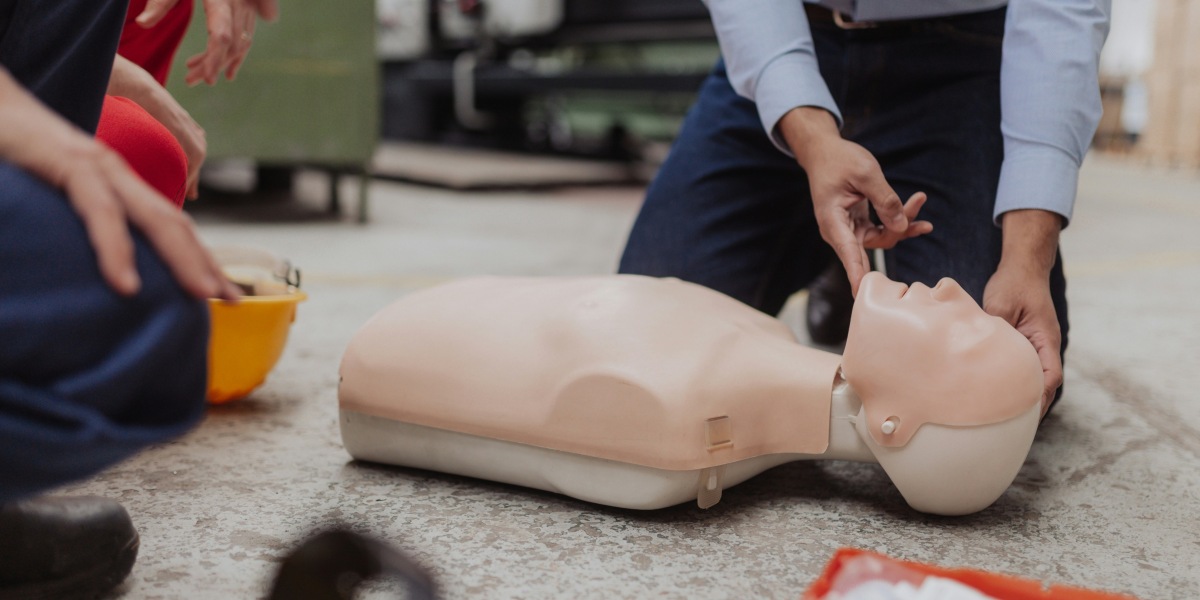Cruise ships offer luxurious and unforgettable experiences for passengers onboard, yet their safety can rely on the remote staff for any medical crisis. The Centers for Disease Control and Prevention(CDC) reported virus outbreaks on ships in 2024, impacting over 3% of passengers in their report “Outbreaks on Cruise Ships in VSP’s Jurisdiction”.
Since high-risk areas on the sea lack access to shore-based care, obtaining certification in first aid becomes crucial for handling a wide variety of medical emergencies en route. First aid training boosts career growth and ensures compliance and professional reliability. This blog guides you on how first aid training trains remote staff in specialized skills to ensure guest safety and create a safe travel experience.
Why Cruise and Remote Hospitality Staff Need First Aid
The Occupational Safety and Health Administration (OSHA) defines first aid as the help provided to an injured or sick person on-site. Its purpose is to save lives, prevent minor conditions from worsening, and aid in recovery until a qualified professional arrives.
To manage emergencies, protect guests, and colleagues, remote hospitality staff require First aid Training. The hospitality industry faces unique risks, and receiving medical assistance may take time, which is why a rapid response in critical situations can be lifesaving.
Maritime safety regulations align with the requirements of OSHA standards (29 CFR 1910.151), which mandate that first aid supplies be accessible and training be provided to address workplace hazards. The appropriate training is crucial, and the staff will help manage the emergencies in the following common areas:
- Kitchen Injuries: Treat burns, cuts, and slips.
- Poolside Accidents: CPR and water safety.
- Food Allergies: Spot symptoms, give epinephrine.
- Slip and Falls: Assess and care fast.
- Cardiac Events: Cardiopulmonary Resuscitation(CPR), Automated External Defibrillator(AED).
- Choking: Common in dining areas while eating.
- Respiratory Crisis: Asthmatic victim, Chronic Obstructive Pulmonary Disease(COPD)
- Mental Health Crisis: First Aid for Mental Well-Being
- Heat Stroke: Spot and treat heat-related illnesses
What are Specialized First Aid Skills for Remote Settings
Maritime and remote workers need specialized first aid skills because they are dealing with isolation and medical resource unavailability, as we will discuss in the following ways:
Specialized Remote Staff CPR and AED
According to OSHA Standard 29 CFR 1910.151, cruise staff operating in distant waters are required to learn CPR and use AEDs. CPR keeps the blood and oxygen flowing to the brain and rescue breaths, and AEDs reestablish a normal rhythm. A well-timed action, e.g., a cruise ship server trained in CPR and AED use, administers CPR compressions, and uses an AED onboard to save a cruise ship passenger during collapse.
Treating Seasickness and Dehydration with First Aid
Certain passengers are more at risk of dehydration and seasickness, experiencing excessive fluid loss, stress, perspiration, and vomiting. First aid helps identify symptoms early and treat them with fluid, remedies such as fresh air, light nourishment, and relaxation measures.
Heimlich Maneuver to Treat Choking
Choking presents a life-threatening situation that’s quite common in dining areas on superyachts and cruise ships. The abdominal thrusts, also known as the Heimlich maneuver, are a vital first-aid procedure for removing airway obstructions. It saves the victim by dislodging the obstruction and clearing the airway, allowing for successful breathing.
Anaphylaxis Management and Allergy
Recognizing and responding quickly to food allergies that can cause severe anaphylaxis is vital, especially in dining and bar areas. Buffet servers and restaurant attendants must be trained on clear protocols for food labeling, guest communication, and identifying allergy symptoms to administer epinephrine promptly, thereby reducing escalation.
First Aid for Burns and Scalds
Personnel should cool the burn for 10 minutes by running cool water, loosening tight clothing or jewelry, and applying a sterile dressing to the affected areas. Effective first aid treats burns and scalds, minimizes pain, restricts damage, and eliminates infection in the kitchen’s most common injury.
Wound Management and Injury Care
As a part of advanced training, it must also include the management of wounds and injuries. An example of this includes remote hospitality staff managing a kitchen burn injury, which minimized the risk of infection and reduced infection downtime, thereby preventing loss of productivity.
Handling Spinal Injuries
Advanced training must include the management of spinal injuries. An example of this is when a hotel staff member stops to help a guest who has slipped and fallen, thereby preventing a slip injury from worsening.
Adapting First Aid in Limited Resource Settings
Staff in maritime and remote locations must adapt and improvise when there’s no access to numerous supplies and hospitals. One has to conduct Triage(rapid assessment of potential victims to identify who gets attention first) and injury stabilization amid the rough sea challenges, such as storms, to avert death until it is possible to evacuate.
Emergency Communication for Guest Safety
Impeccable communication ensures coordination with emergency services to ensure utmost safety and passenger confidence. Confident staff offer reassurance to guests. Clear communication facilitates coordination between guests and responders, and calm handling reduces panic in crisis situations.
What are the Steps to First Aid Training With Remote Focus
First aid courses train tourism staff working in isolated areas to deal with emergencies and stay safe. Let us now touch upon the various implications of certification of the first aid training, further below:
Step 1: Select Accredited Course
The initial step is to find a suitable training program. Standards for Training, Certification and Watchkeeping for Seafarers (STCW), adopted by the International Maritime Organization(IMO), endorse training that is safe and standard-compliant in the maritime sector, or you can opt for a specialized remote first aid course that is specifically designed for the wilderness or an isolated area.
Step 2: Select the Preferred Mode of Delivery
Modern training offers various options, including in-person sessions for essential hands-on skills, blended courses that combine online theory with practical workshops, and fully online options for self-paced remote learning, which are suitable for staff in isolated areas.
Step 3: Enroll and Finish Training
Enroll the staff in these courses, ensuring they meet the requirements for certification, such as STCW standards for maritime personnel or recognized protocols for the remote environment.
First aid training is often customized to cover specific scenarios, such as pool accidents or water-related injuries, and to deal confidently with rip currents or jellyfish stings, ensuring guest safety in remote settings. It emphasizes other areas where first aid skills can provide unwavering support, such as CPR, AED use, and choking relief, emergency protocols, evacuation, and communication. The training focuses more on cuts, falls, and allergies, as well as mental health first aid for guests.
Step 4: Real Life Scenario Practice
It includes performing emergency response rehearsals, casualty handling, and medical assistance related to the maritime nature of the scenarios involving bleeding control, CPR, airway management, and injury care in isolated areas.
Simulation, virtual reality, and online modules enable staff to practice emergencies such as CPR or spills at any time, thereby building hands-on skills for isolated settings. It mimics real-life scenarios, making it an ideal option spread across remote zones.
Step 5: Certification and Compliance on Continuing Education
After training, certification is earned by passing practical and written tests from trusted credentials that are valid for maritime or remote zones. Certificates are valid for two years and are issued on the same day.
Refresher certification must be done on time; otherwise, the initially learned skills will get outdated and out of compliance. Frequent updates and instantaneous feedback are necessary to stay up-to-date and effective. Another important aspect is the prevention and management training of Musculoskeletal Disorders (MSDs) caused by lifting and repetitive movements.
Get First Aid, Saves Lives Anywhere
First Aid training endows cruise and out-of-hotel hospitality personnel with life-saving skills to respond to emergencies quickly and confidently on board. This ensures compliance, enhanced guest safety onboard, and reduced medical risks in remote locations. Advanced training and on-time certification ensure a ready and proficient staff to face unique marine challenges.
An Online First Aid Course can help you achieve this and become an essential asset to make a life-sustaining difference every voyage needs.
Disclaimer: The information provided in this article is for general educational purposes only. It is not intended as medical advice. Always seek professional medical assistance in case of emergencies. Certification and training programs should be selected based on local regulations and standards.


















